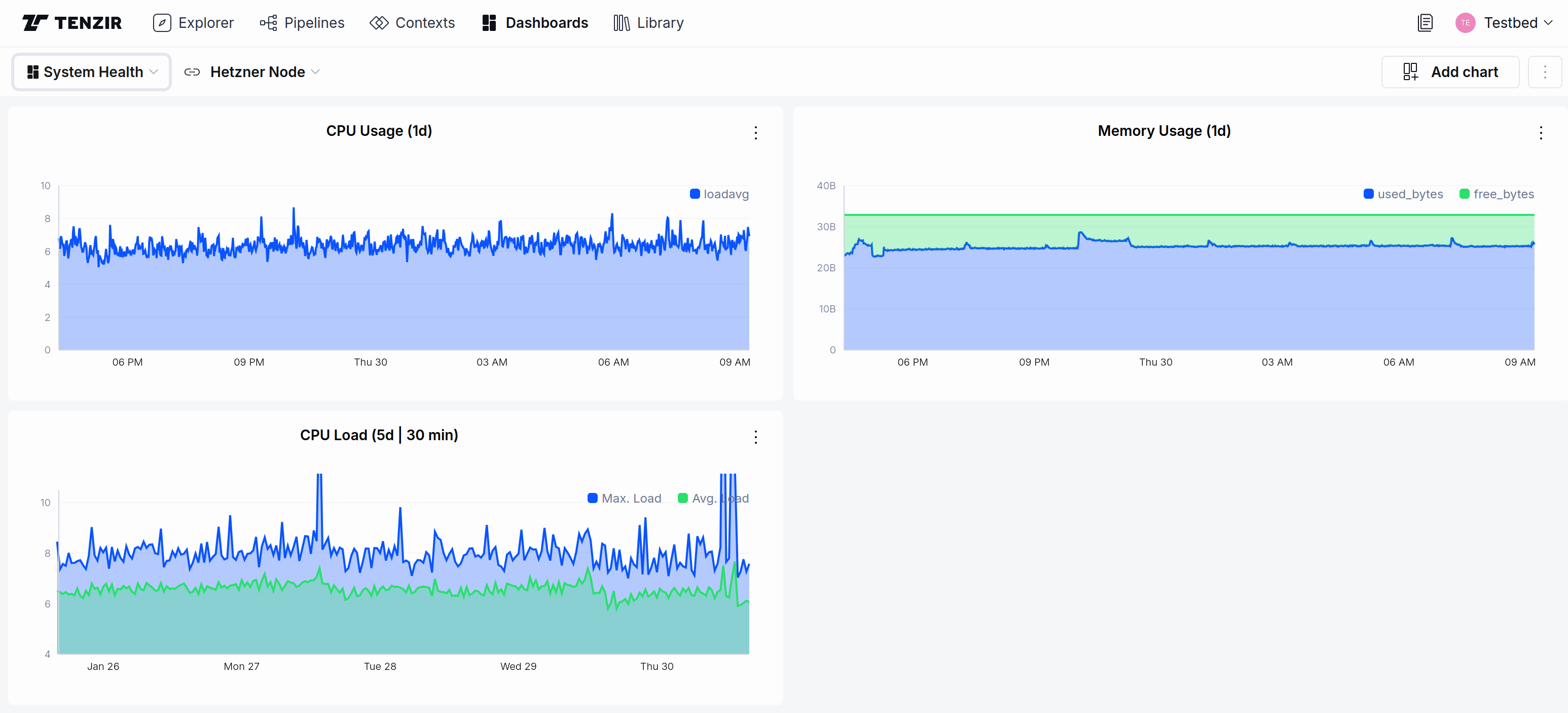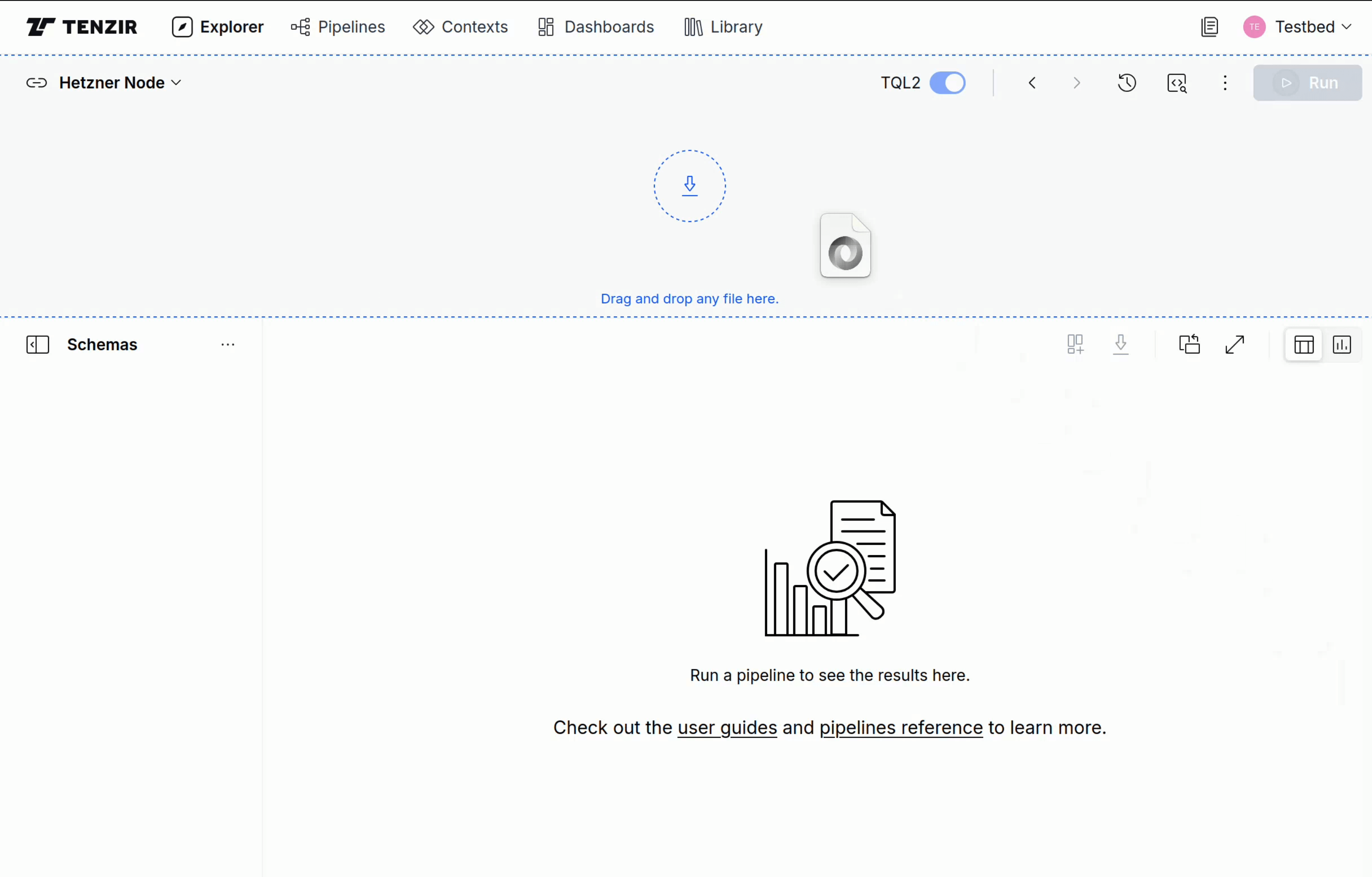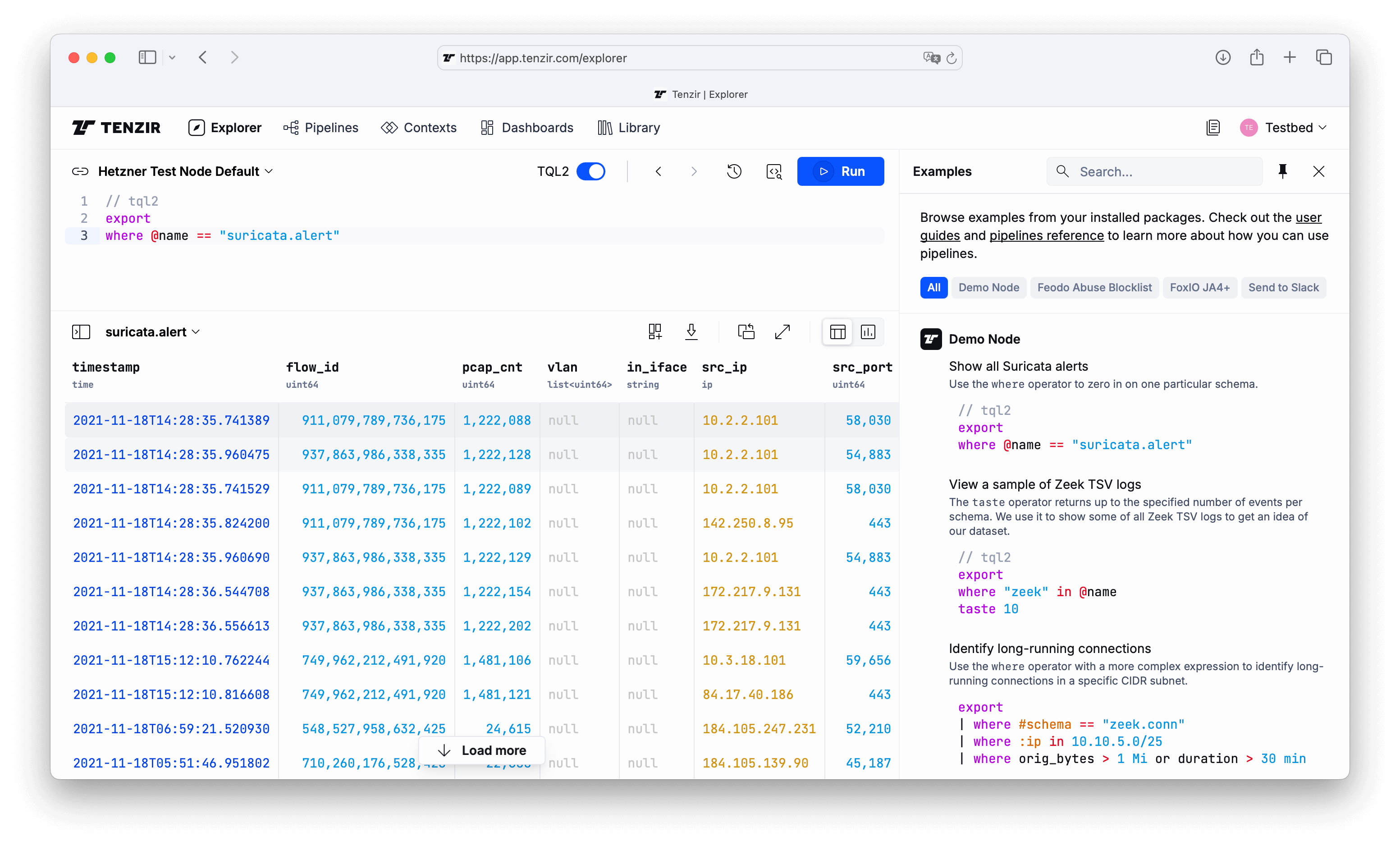Tenzir Node v5.2 brings our most requested feature to life, adding the ability to watch a local filesystem directory or a blob storage bucket for new files within a pipeline.
Tenzir Platform v1.10: Restructured Layout and Static Workspaces
Today, we're releasing Tenzir Platform v1.10, which introduces a restructed page layout and the ability to statically define workspaces in on-prem environments.
Tenzir Node v5.1: Moving Fields
Tenzir Node v5.1 adds more flexible ways to access and move fields, bitwise functions, and a native integration with Google Cloud Logging.
Tenzir Node v5.0: TQL2, Always
Tenzir Node v5.0 makes TQL2 the default and only option throughout Tenzir.
Tenzir Node v4.32: Google SecOps
Tenzir Node v4.32 features a new Google SecOps sink operator and improvements to accessing structured types in TQL.
Tenzir Node v4.31: OpenSearch Ingestion and if-expressions
Tenzir Node v4.31 is now available, with several new features including OpenSearch emulation for broader data ingestion, flexible if/else expressions in TQL, and a new operator for writing Syslog messages.
Tenzir Node v4.30: ClickHouse Integration
Tenzir Node v4.30 introduces a to_clickhouse
operator and streamlines the TLS settings for all operators.
Tenzir Platform v1.9: Accelerated Data Exploration
We're happy to announce Tenzir Platform v1.9, introducing the next generation of the Tenzir Platform's Explorer.
Tenzir Node v4.29: Nested Printing
Tenzir Node v4.29 introduces new functions for printing values as strings, complementing v4.28's parsing functions.
Tenzir Node v4.28: Nested Parsing
Tenzir Node v4.28 makes it easier than before to parse deeply nested data structures.
Tenzir Node v4.27: Amazon MSK IAM Integration
Tenzir Node v4.27 enhances the charting capabilities and integrates with IAM for authenticating to Amazon MSK.
Tenzir Platform v1.8: Charting the Unknown
We're happy to announce Tenzir Platform v1.8, with new and improved charting as well as a new single-user mode for Sovereign Edition users.

Tenzir Node v4.26: Amazon Security Lake Integration
Tenzir Node v4.26 enhances our native Parquet and OCSF capabilities with a new operator for writing data directly to Amazon Security Lake (ASL).
Tenzir Node v4.25: Sinks Galore!
Tenzir Node v4.25 adds new sinks for Snowflake, OpenSearch, and Elasticsearch, allowing seamless data integration and output. It also introduces major enhancements to TQL2, including new language features and operator improvements.
Tenzir Platform v1.7: Explorer Drag'n'Drop
To kick off the new year, we're releasing Tenzir Platform v1.7, featuring support for file drag and drop and a lot of stability improvements.

Tenzir Platform v1.6: Example Pipelines
We're happy to announce Tenzir Platform v1.6, featuring a new UI for example pipelines and support for the new TQL2 mode for nodes.

Tenzir Platform v1.5: Revamped Dashboards
Today we're announcing Tenzir Platform v1.5, which brings a richer dashboarding experience and adds a new contexts page.
Tenzir Node v4.24: List Manipulation
Working with lists is easier than ever with Tenzir Node v4.24 and its new functions for list manipulation. Also, contexts are now first-class citizens in TQL2.
Tenzir Platform v1.4: Platform Alerts
We're excited to announce that Tenzir Platform v1.4 brings you monitoring capabilities with alerts for offline nodes, along with a bundle of delightful improvements throughout the application.
Tenzir Node v4.23
Tenzir Node v4.23 comes with a new load_balance operator,
a dedicated to_splunk sink, Universal Function Call Syntax and much more!
Tenzir Platform v1.3
Tenzir Platform v1.3 brings a redesigned explorer page, better behavior of the event inspector, and many other fixes.
Tenzir Platform v1.2
Tenzir Platform v1.2 brings improvements to diagnostics in the Explorer, the ability to download charts, and many stability improvements.
Tenzir Node v4.22
Tenzir Node v4.22 comes with documentation for the new version of the Tenzir Query Language, connectors for Google Cloud Pub/Sub and various bug fixes.
Tenzir Node v4.21
Parsing is now easier, faster, and better than before with Tenzir Node v4.21. Also: introducing an all-new integration with Azure Blob Storage.
Tenzir Platform v1.1
Tenzir Platform v1.1 is here! This release brings key enhancements, including improved diagnostics, authentication updates, and various bug fixes for a smoother user experience.
Tenzir Node v4.20
Tenzir Node v4.20 is here, bringing a host of under-the-hood improvements that pave the way for exciting upcoming changes to the Tenzir Platform.
Tenzir v4.19
Tenzir v4.19 now supports installing pipelines and contexts together in packages, an all-new mechanism that makes installing integrations easier than before.
Tenzir v4.18
Monitoring Tenzir nodes is easier than before with Tenzir v4.18 and its new health metrics.
Tenzir v4.17
The new Tenzir v4.17 brings an integration with Azure Log Analytics and adds support for expiring entries in lookup tables.
Tenzir v4.16
Pipelines now connect more flexibly than ever before with Tenzir
v4.16 and its upgraded
publish and
subscribe operators.
Tenzir v4.15
Tenzir v4.15 is now available for download. The Tenzir Platform now shows live-updating pipeline activity, and the Tenzir Node has improved support for subnet keys in lookup tables, and installs natively for RedHat Linux and its derivatives.
Tenzir v4.14
Introducing Tenzir
v4.14: A major update to
the summarize operator with new aggreagtion functions, and support for slicing
with strides.
Tenzir v4.13
We've just released Tenzir v4.13, a release focusing on stability and incremental improvements over the feature-packed past releases.
Tenzir v4.12
We are thrilled to announce Tenzir v4.12, a feature-packed release introducing numerous enhancements. Notable additions include list unrolling, event deduplication, and the deployment of advanced pipeline architectures with publish-subscribe. We've also added a download button, extended support for UDP, and implemented many other refinements to improve your experience.
Tenzir v4.11
Our latest v4.11 release delivers powerful automation features, such as scheduling pipelines in a given time interval and sending pipeline data as emails.
Tenzir v4.10
Today, we're releasing Tenzir v4.10, which improves how Tenzir integrates with modern deployment practices.
Tenzir v4.9
We're thrilled to announce the release of Tenzir v4.9, enhancing the Explorer further to empower you with the capability of rendering your data as a chart.
Tenzir v4.8
Hot off the press: Tenzir v4.8. This release is filled with goodness.
Tenzir v4.7
Tenzir v4.7 brings a new context type, two parsers, four new operators, improvements to existing parsers, and a sizable under-the-hood performance improvement.
Tenzir v4.6
Tenzir v4.6 is here, and
it is our biggest release yet. The headlining feature is the all-new context
feature, powered by the context and enrich operators and the new context
plugin type.
Tenzir v4.5
Here comes Tenzir v4.5! This release ships a potpourri of smaller improvements that result in faster historical query execution and better deployability.
Tenzir v4.4
Tenzir v4.4 is out! We've focused this release on integrations with two pillars of the digital forensics and incident response (DFIR) ecosystem: YARA and Velociraptor.
Tenzir v4.3
Exciting times, Tenzir v4.3 is out! The headlining feature is Fluent
Bit support with the fluent-bit source and sink operators. Imagine
you can use all Fluent Bit connectors plus what Tenzir already offers. What a
treat!
Tenzir v4.2
Tenzir v4.1
After our successful launch of app.tenzir.com of Tenzir v4.0 at
Black Hat, the new v4.1 release continues with several
enhancements based on early feedback. We bring to you a (i) new mechanism to
pause pipelines, (ii) a new operator to match Sigma rules, (iii) new operators
for in-pipeline (de)compression, and (iv) a revamp of the show operator.
VAST v3.1
VAST v3.1 is out. This is a small checkpointing release that brings a few new changes and fixes.
VAST v3.0
VAST v3.0 is out. This release brings some major updates to the the VAST language, making it easy to write down dataflow pipelines that filter, reshape, aggregate, and enrich security event data. Think of VAST as security data pipelines plus open storage engine.
VAST v2.4.1
VAST v2.4.1 improves the performance of queries when VAST is under high load, and significantly reduces the time to first result for queries with a low selectivity.
VAST v2.4
VAST v2.4 completes the switch to open storage formats, and includes an early peek at three upcoming features for VAST: A web plugin with a REST API and an integrated frontend user interface, Docker Compose configuration files for getting started with VAST faster and showing how to integrate VAST into your SOC, and new Python bindings that will make writing integrations easier and allow for using VAST with your data science libraries, like Pandas.
VAST v2.3.1
VAST v2.3.1 is now available. This small bugfix release
addresses an issue where compaction would hang if encountering
invalid partitions that were produced by older versions of VAST when a large
max-partition-size was set in combination with badly compressible input data.
VAST v2.3
VAST v2.3 is now available, which introduces an automatic data defragmentation capability.
VAST v2.2
We released VAST v2.2 🙌! Transforms now have a new name: pipelines. The summarize operator also underwent a facelift, making aggregation functions pluggable and allowing for assigning names to output fields.
VAST v2.1
VAST v2.1 is out! This release comes with a particular focus on performance and reducing the size of VAST databases. It brings a new utility for optimizing databases in production, allowing existing deployments to take full advantage of the improvements after upgrading.
VAST v2.0
Dear community, we are excited to announce VAST v2.0, bringing faster execution of bulk-submitted queries, improved tunability of index structures, and new configurability through environment variables.
VAST v1.1.2
Dear community, we are happy to announce the release of VAST v1.1.2, the latest release on the VAST v1.1 series. This release contains a fix for a race condition that could lead to VAST eventually becoming unresponsive to queries in large deployments.
VAST v1.1.1
Dear community, we are excited to announce VAST v1.1.1.
This release contains some important bug fixes on top of everything included in the VAST v1.1 release.
VAST v1.1
Dear community, we are excited to announce VAST v1.1, which ships with exciting new features: query language plugins to exchange the query expression frontend, and compaction as a mechanism for expressing fine-grained data retention policies and gradually aging out data instead of simply deleting it.
VAST v1.0
We are happy to announce VAST v1.0!
This release brings a new approach to software versioning for Tenzir. We laid out the semantics in detail in a new VERSIONING document.









